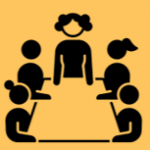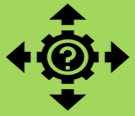Assessment at St. Olaf has long been understood as “inquiry in support of student learning.” We gather systematic evidence of our students’ knowledge, proficiencies, and learning experiences, so we can sustain what is working and strengthen what needs to be improved.
We are committed to an assessment program that is:
 Student-centered – Assessment helps us determine the extent to which we are realizing the educational goals we have established for our students.
Student-centered – Assessment helps us determine the extent to which we are realizing the educational goals we have established for our students.
Intended learning outcomes for the OLE Core (general education) curriculum and for majors, concentrations and other academic programs guide our data-gathering at the program level.
 Mission-driven, meaningful, and manageable – Assessment advances the mission of the college by helping us evaluate and strengthen our work with students.
Mission-driven, meaningful, and manageable – Assessment advances the mission of the college by helping us evaluate and strengthen our work with students.
We use a variety of approaches to gathering evidence, because multiple methods are more likely to yield meaningful results. We streamline our work through a survey and OLE Core assessment schedule that cycles through different types of surveys and assessments each year.

Equitable – Assessment is used as a means to advance the equity goals of the College. Practitioners are encouraged to pay attention to the ways in which their assessment practices align with best practices for equity-minded assessment.
Equity goals should be assessed regularly to gather meaningful evidence about progress. Those conducting assessments should use an equity-minded approach to ensure that their findings reflect the experiences of all students and provide students with multiple ways to demonstrate their learning. Visit the IE&A page on Equity in Assessment to learn more.
 Faculty and staff-supported – The assessment program is led through a partnership between the elected faculty Academic Assessment Committee, the Provost, the Co-curricular Assessment Committee, and Institutional Effectiveness and Assessment.
Faculty and staff-supported – The assessment program is led through a partnership between the elected faculty Academic Assessment Committee, the Provost, the Co-curricular Assessment Committee, and Institutional Effectiveness and Assessment.
The Academic Assessment Committee advises faculty, departments, programs, and the college on assessment procedures and methods for academic program-level assessment and assessment of the OLE Core. The Co-curricular Assessment Committee supports existing staff efforts to gather assessment evidence about student learning in the co-curriculum and advocates for growth and expansion of these efforts. Both work with IE&A to carry out St. Olaf’s assessment program.
 Utilization-focused – Most assessment begins with the question, “Who will use the evidence that is gathered, and for what purpose?”
Utilization-focused – Most assessment begins with the question, “Who will use the evidence that is gathered, and for what purpose?”
Staff and faculty conducting assessments are encouraged to focus on how they plan to use findings to adjust curriculum requirements, program or course content, student assignments, instructional practices, or their work with and support of students.
 Transparent – While St. Olaf faculty, staff, and students are the principal “users” of assessment results, we make our findings readily available to the St. Olaf Board of Regents and to the larger community as well.
Transparent – While St. Olaf faculty, staff, and students are the principal “users” of assessment results, we make our findings readily available to the St. Olaf Board of Regents and to the larger community as well.
The most recent findings from all our institutional-level surveys and assessment projects are publicly-accessible on the IE&A website (under “What We Know About…”) or the Academic Assessment Committee website.
Image credits from The Noun Project: student by Ladalle CS; Mission by Nithinan Tatah; Equity by Laura Amaya; decision by Template; window by Joel Bryant
You must be logged in to post a comment.